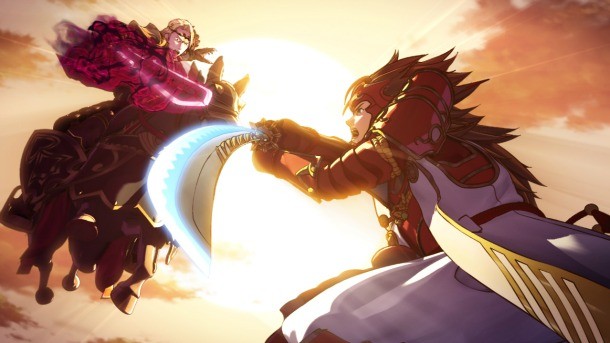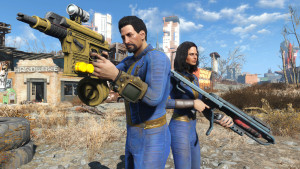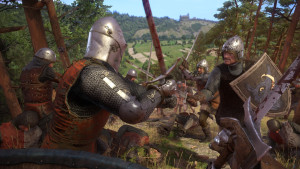Please support Game Informer. Print magazine subscriptions are less than $2 per issue
Fire Emblem Fates: Birthright Review

What does “family” mean? Is it the people we’re related to by blood or is the ones we grow close to? Is blood stronger than bond? Fire Emblem Fates, much like its predecessor Awakening, does not shy away from asking hard questions or forcing players into difficult predicaments. This strategy/RPG hybrid puts you in control of a growing army, but your forces aren’t composed of nameless infantry units. Instead these soldiers have names, personalities, and are capable of falling in love. They’re well-rounded, lovable characters whose very fates lay in your hands.
Fire Emblem Fates succeeds as both a tactics game and a story generator, letting your decisions in and out of battle determine how the lives of these people play out. Perhaps you have to give up your childhood friend’s life for the greater good. Maybe you dislike certain characters and deliberately send them to their dooms. Maybe you’re just a fantastic commander who can keep every single one of your troops alive and happy. The flexibility of Fates’ structure works together with you, so you’re constantly spinning a tale; it makes you a general and a storyteller at the same time, and the combination works well.
Birthright is one of two versions of Fire Emblem Fates (with a third on the way as DLC), that casts you as a kidnapped noble of Hoshido who has been reunited with the family you were born into, waging war against the kingdom who kidnapped you and raised you as a child, Nohr. Though you do spend the majority of time fighting battles against Nohr, your character’s main goal is to bring about peace between the two kingdoms – but life doesn’t always go according to plan.
Birthright is a surprisingly dark tale, even grimmer than Awakening, with tragic moments that filled me with anger and sadness as I watched my poor protagonist and her siblings undergo trials and lose friends. The story is certainly in the mold of a classic adventure that pits good against evil, but it tethered me emotionally to my band of heroes, misfits, and adopted loners, which made the hard parts of the story devastating and the victories that much more meaningful.
Awakening’s robust battle system returns with only a few minor tweaks. You fight on tiled battlefields with a mixture of units, and all of them have strengths and weaknesses. You have a set number of moves each turn for each unit, and every one of them can commit only one action, like fighting or using an item. Battles between individual units still rely on a sword and spears version of rock-paper-scissors and play out in quick, well-animated sequences. While this template for turn-based combat doesn’t reinvent the wheel, the speed and balanced mechanics of these battles makes them both challenging and enjoyable. My favorite change to the classic systems is that weapons (outside of healing spells) no longer have a limited number of uses, saving you from having to go to the store every few battles, which was an absolute pain in Awakening.
If you’re playing on Classic mode, a soldier who loses in battle ends up dying and disappears from your playthrough. This adds an edge to battles, raising the stakes and forcing you to make difficult decisions, perhaps sacrificing some of your favorite characters for the greater good, creating a combination of tragic and moving moments that are unique to nearly every playthrough. Players can opt out of this by choosing to play on other modes – one that has characters recovering health after every battle, and another that immediately brings them back on the field as soon as they’re taken out (essentially making losing a battle impossible). This wide range of accessibility options is great since it welcomes series newcomers into the fold and allows them to determine how they want to experience the game on their own terms.
When you’re not fighting against the Nohr, its puppet kingdoms, or the dreaded Faceless, you spend time in your castle, the biggest (and coolest) addition to the series. The castle functions as your base of operations; you build shops and recreation areas for your characters, and defenses for the castle itself. This fortress serves as a tangible representation of what you’re building throughout the journey, and what you’re getting for all the sacrifices you make on the battlefield. Beyond upgrading shops so you can purchase better weapons, this is also where you spend time with your troops, talking to them and growing closer through cute cutscenes that use each character’s quirks to comedic and heartfelt effect so that nearly every relationship that can bloom feels organic instead of forced.
One of the important lessons to learn during Birthright is that improving relationships is a significant part of the game. Units who fight together in battle become closer. If those units are of the opposite sex, and they are compatible, they can eventually get married and have children who, through the power of vaguely explained and plot-convenient magic, suddenly grow into battle-capable adults. It’s goofy, but the tactical boon the offspring give you (as well as the sheer delight of seeing your favorite characters fall in love and have a kid) makes that goofiness a small price to pay.
The worst thing I can say about Birthright is that the game doesn’t explain its systems particularly well. After an hour-long prologue you don’t receive any detailed instruction on how to do anything outside of the occasional castle-related tutorial. The rest is up to you to figure out since certain features, like marriage and children, aren’t in the tutorial. Fans of Awakening should pick things up quickly, but series newcomers could easily miss some of the neat features.
Birthright is its own epic saga, with at least 25 hours of playtime and a load of sidequests and goodies to discover during the course of its satisfying and moving story about identity, family, and love. It tricked me into falling in love with its cast of characters and then made me weigh their lives against the fate of the world over and over again. Birthright is a grueling, fantastic experience that not only matches the quality of its predecessor but possibly outshines it as well, more than earning its place at the table of must-play strategy/RPGs.
Looking for something a little more challenging? Check out our review of Birthright's companion release, Fire Emblem Fates: Conquest.

















